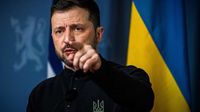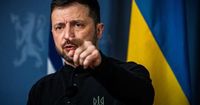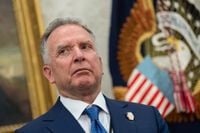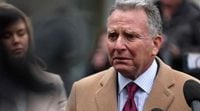In a controversial interview aired on March 21, 2025, U.S. special envoy Steve Witkoff stated that key regions in Ukraine, including Donbas and Crimea, seek to be under Russian control, stirring outrage among politicians and commentators alike. Witkoff's remarks echo Russian propaganda and raise serious questions about the direction of U.S. diplomatic efforts concerning the ongoing conflict between Ukraine and Russia.
During the interview with former Fox News anchor Tucker Carlson, Witkoff claimed, "I think the largest issue in that conflict are these so-called four regions, Donbas, Crimea ... and there's two others." He described these areas as "Russian-speaking" and asserted that there had been referendums indicating that the majority of residents wished to live under Russian rule. However, he failed to mention that these referendums, occurring under the threat of violence, have been widely condemned as sham efforts to legitimize Russia's illegal annexation.
Witkoff, a billionaire real estate developer with no prior diplomatic experience, has become a key figure in negotiations with Russia since his appointment by former President Donald Trump. Following his comments, cross-party British politicians expressed their outrage, branding him as "a disgrace" and arguing that his statements undermined Ukraine's sovereignty. Labour MP Neil Coyle stated, "Many people in Florida and Texas speak Spanish but it would be idiotic and offensive to claim that they belong to Spain," highlighting the absurdity of Witkoff's assertions.
Sarah Green, a member of the All-Party Parliamentary Group on Ukraine, echoed this sentiment, saying, "Witkoff doesn’t care about Ukraine’s sovereignty. He’s more comfortable repeating Putin’s propaganda than supporting Ukraine’s heroic fighters and civilians." His statements have been met with accusations of being "breathtakingly ill-informed" and an outright disgrace, as described by former Tory MP Dr. Bob Seely, who noted, "This man is simply regurgitating Kremlin propaganda. He should apologise to Ukrainians."
Witkoff's observations reflect a broader pattern of dismissing the reality faced by citizens in the occupied territories; his failure to remember the names of the districts he mentioned adds to concerns regarding his competence as a negotiator. Notably, Witkoff repeatedly mixed up Crimea, which Russia annexed in 2014, with other eastern territories that have been embroiled in conflict since 2022.
His insistence on Ukraine's leadership organizing presidential elections, a process constitutionally barred during wartime, has also raised eyebrows. "Zelensky is in a very, very difficult situation, but he's up against a nuclear nation," Witkoff stated, suggesting that Ukrainian President Volodymyr Zelensky needs to negotiate with Moscow. Such sentiments are perceived by many as pressure on Ukraine to capitulate to Russian demands.
Further complicating matters, Witkoff claimed to have a friendly rapport with Russian President Vladimir Putin, asserting that the Russian leader had prayed for Trump following an assassination attempt during the campaign in July 2024. Witkoff detailed how Putin commissioned a portrait of Trump, which he was instructed to deliver to the U.S. president—a gesture that Witkoff described as a "gracious moment." However, the implications of such remarks have prompted critics to question whether Witkoff is fit to represent U.S. interests while seemingly fostering a more amicable relationship with the Kremlin.
Witkoff's remarks have not only raised alarm about the potential for diplomatic overreach but have also highlighted the ongoing complexity of the war. As presidential elections loom, Witkoff's push for negotiations places Ukraine's sovereignty at risk, suggesting his comments are part of a broader narrative intended to reshape the core discussion surrounding the territorial integrity of Ukraine.
With tensions remaining high, the stakes of these allegations and ensuing political fallout underscore the difficulties inherent in actually achieving a just resolution to the war. Witkoff's comments have shed light on the fragile nature of international diplomacy at a time when every statement can lead to misinterpretations and escalated responses from all sides involved.
The backlash from various political figures predominantly reflects a unified condemnation of Witkoff's stance, emphasizing the need for clarity, understanding, and respect for established international norms. As geopolitical tensions persist, ensuring the protection of Ukrainian sovereignty remains paramount, even amid the evolving narrative of peace negotiations.




